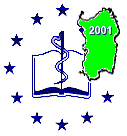 |
We never close: 24 hour knowledge
for a 21st health service. Bob Gann, Director, NHS Direct Online, Veronica Fraser, NHS Library Adviser NHS Direct Online - Highcroft, Romsey Road Winchester, SO22 5DH (United Kingdom) bgann@hfht.org, Veronica.Fraser@doh.gsi.gov.uk |
|
|
Click here to see the ppt presentation |
|
|
 |
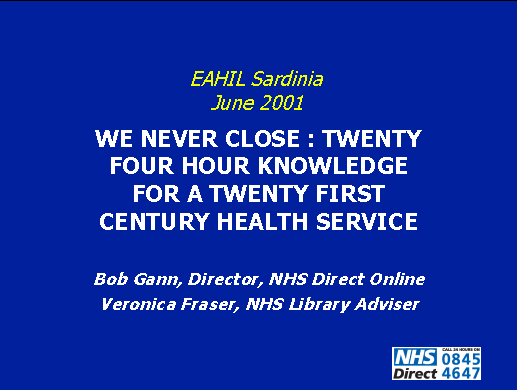
Health care is provided 24 hours a day, 7 days a week, every week of the year. While most of us sleep, doctors and nurses make difficult clinical decisions, trainees and students may
find their only time to learn, patients are worried and in pain.
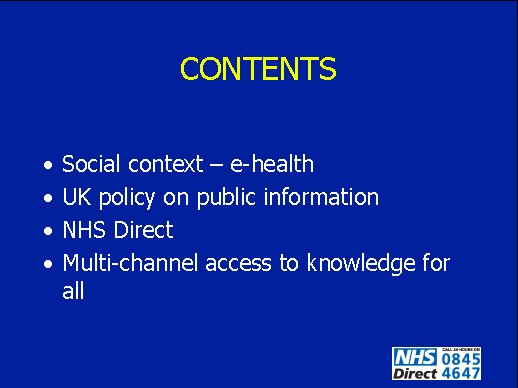 In this presentation we shall be looking at the social and technological changes which are making this possible, the UK government's policy on public information, the development of the innovative 24 hour NHS Direct service, and how we can join this all together to develop effective multi-channel access to round the clock health information for all. 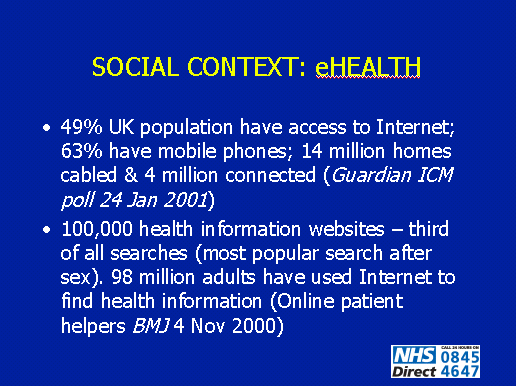 Over the past five years we have seen a revolution in the ways in which people access information. Around half the UK population now has access to the Internet at home or in the work place. 63% of the population own mobile phones (that's 35 million phones). 14 million UK homes have cable TV connections and 4 million are cable subscribers.
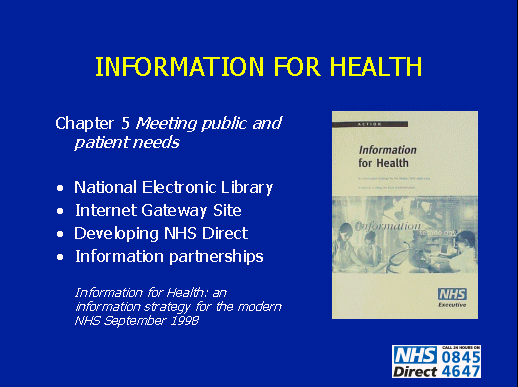 So how is government policy responding to this rapidly changing world? UK policy developments on information for health professionals has already been well covered by my co-author Veronica Fraser so here I will concentrate on information for patients and the wider public.
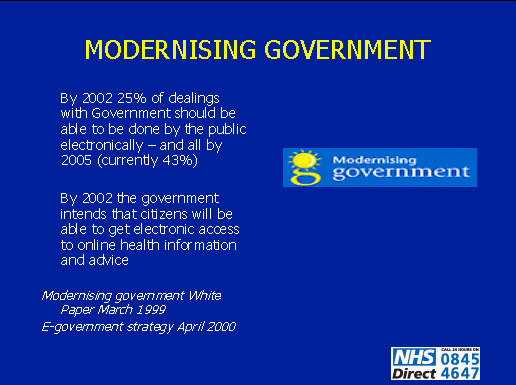 But this was more than an issue for health care policy. The government is determined to make the UK a world leader in e-government. Under the Modernising Government strategy, all transactions between government services and citizens should be capable of being undertaken electronically by 2005 - and a quarter of those by 2002. One of that first quarter targets is electronic access to health information and advice. But this was more than an issue for health care policy. The government is determined to make the UK a world leader in e-government. Under the Modernising Government strategy, all transactions between government services and citizens should be capable of being undertaken electronically by 2005 - and a quarter of those by 2002. One of that first quarter targets is electronic access to health information and advice.
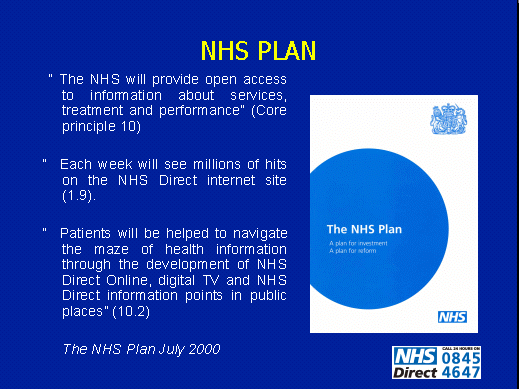 Last year these intentions were comprehensively reinforced by the publication of the ten year NHS Plan. The Plan identified ten key principles of a good 21st century health care service. Significantly one of these was to provide open access to information about treatments and health services. More specifically the NHS Plan identified NHS Direct Online as a central information source for patients and the public, accessible in an increasingly multi-channel way via the web, public information kiosks and digital tv. Last year these intentions were comprehensively reinforced by the publication of the ten year NHS Plan. The Plan identified ten key principles of a good 21st century health care service. Significantly one of these was to provide open access to information about treatments and health services. More specifically the NHS Plan identified NHS Direct Online as a central information source for patients and the public, accessible in an increasingly multi-channel way via the web, public information kiosks and digital tv.
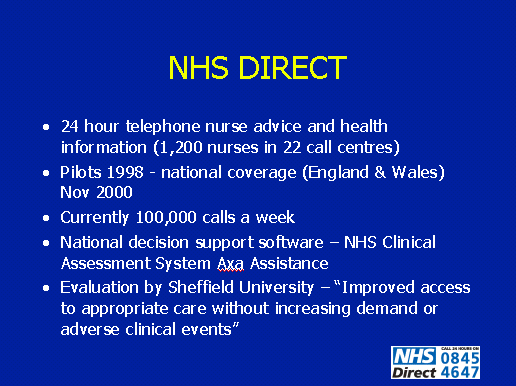 So how far have we progressed with NHS Direct - a flagship of the government's modernisation programme? The first NHS Direct services were established in 1998, with rapid roll-out to the whole of England and Wales by the end of last year. NHS Direct provides 24 hour telephone access to health advice and referral on to other health services, provided by specially trained nurses working from 22 call centres around the country. Calls are currently amounting to 100,000 a week but can increase significantly in response to advertising or a health scare. All call centres now use a decision support software provided under a contract with the international company Axa assistance. Evaluation of NHS Direct is suggesting that the service leads to "improved access to appropriate care without increasing demand or adverse clinical
events" So how far have we progressed with NHS Direct - a flagship of the government's modernisation programme? The first NHS Direct services were established in 1998, with rapid roll-out to the whole of England and Wales by the end of last year. NHS Direct provides 24 hour telephone access to health advice and referral on to other health services, provided by specially trained nurses working from 22 call centres around the country. Calls are currently amounting to 100,000 a week but can increase significantly in response to advertising or a health scare. All call centres now use a decision support software provided under a contract with the international company Axa assistance. Evaluation of NHS Direct is suggesting that the service leads to "improved access to appropriate care without increasing demand or adverse clinical
events"
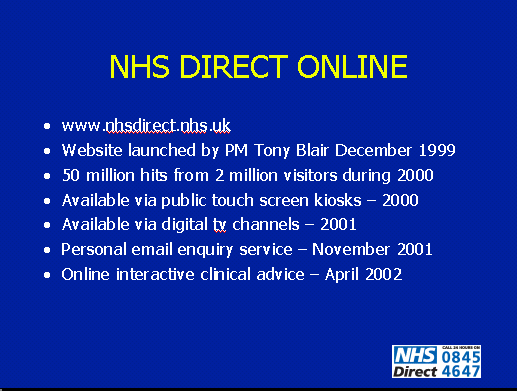 NHS Direct Online is the electronic version of the NHS Direct service. The NHS Direct Online Website was launched by the British Prime Minister Tony Blair in December 1999. During 2000 the site received 50 million hits from 2 million visitors. NHS Direct Online became available via public touch screen kiosks last year, and later this month we are launching NHS Direct Online on digital interactive television. By the end of 2001 a personal email enquiry service for health information requests will be available, and by April 2002 patients will be able to obtain interactive clinical advice online from an NHS Direct nurse. NHS Direct Online is the electronic version of the NHS Direct service. The NHS Direct Online Website was launched by the British Prime Minister Tony Blair in December 1999. During 2000 the site received 50 million hits from 2 million visitors. NHS Direct Online became available via public touch screen kiosks last year, and later this month we are launching NHS Direct Online on digital interactive television. By the end of 2001 a personal email enquiry service for health information requests will be available, and by April 2002 patients will be able to obtain interactive clinical advice online from an NHS Direct nurse.
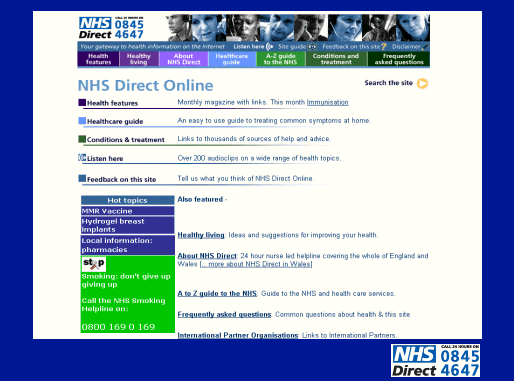 NHS Direct Online provides information for patients and the public on coping with common health problems through simple clinical algorithms, acts as a portal to evaluated sources of health information on the web, and disseminates NHS campaigns and breaking news. The site is deliberately clean and simple in its design and was developed to comply with the Web Accessibility Initiative. NHS Direct Online provides information for patients and the public on coping with common health problems through simple clinical algorithms, acts as a portal to evaluated sources of health information on the web, and disseminates NHS campaigns and breaking news. The site is deliberately clean and simple in its design and was developed to comply with the Web Accessibility Initiative.
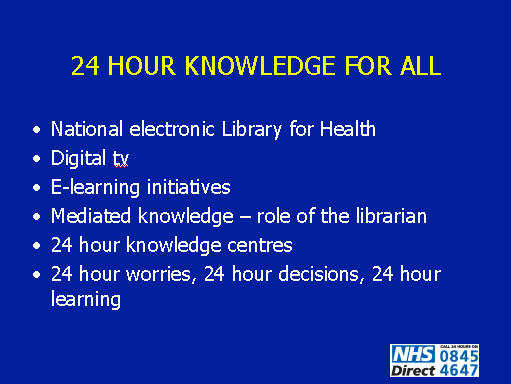 For years consumer health information was seen as a poor relation in library and information services. Over the past five years we have seen many aspects of information provision for patients and the public outstrip provision for healthcare professionals. Now new library and information developments are beginning to bring the vision of a 24 hour knowledge service for all (patients and professionals) closer to reality. Since the end of 2000 the National Electronic Library for Health has provided round the clock online
access to key sources of evidence for healthcare. During 2001 NHS digital
interactive TV pilots will make learning programmes available to healthcare
students and staff at times when they find it convenient to learn. E-learning
initiatives are being developed to maximise the use of new technologies
for more flexible learning. For years consumer health information was seen as a poor relation in library and information services. Over the past five years we have seen many aspects of information provision for patients and the public outstrip provision for healthcare professionals. Now new library and information developments are beginning to bring the vision of a 24 hour knowledge service for all (patients and professionals) closer to reality. Since the end of 2000 the National Electronic Library for Health has provided round the clock online
access to key sources of evidence for healthcare. During 2001 NHS digital
interactive TV pilots will make learning programmes available to healthcare
students and staff at times when they find it convenient to learn. E-learning
initiatives are being developed to maximise the use of new technologies
for more flexible learning.
Despite the use of new direct access technologies there will always be occasions when the librarian is needed as information intermediary. If the information professional brings added value at 2pm how much more so at 2am? In future we can expect to see 24 hour knowledge centres staffed by clinical staff, pharmacists and information professionals meeting the information needs of staff and patients round the clock. This will have significant human resource implications for skills development, flexible working arrangements etc. 24 hour knowledge means helping people to cope with 24 hour worries, 24 hour opportunities for learning, and difficult 24 hour decisions by patients and professionals alike. 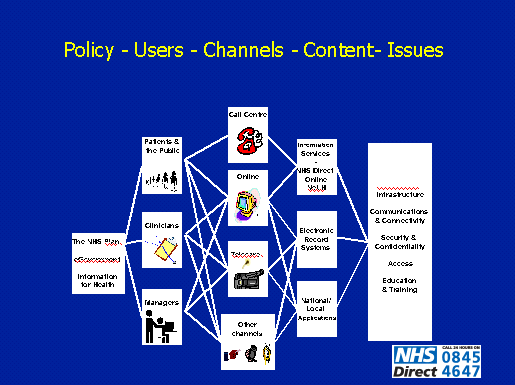 So how do we bring this all together? I will leave you with a diagram from the Information for Health update Building the Information Core, published earlier this year. In this we see a policy rooted firmly in the NHS and wider e-government agendas. We see patients, clinicians and managers regarded as equally important users and stakeholders. We see an emphasis on the need to make use of a range of access technologies. We see the NHS as a major provider of content through knowledge sources such as NeLH and NHS Direct Online, through the individual patient record, and through local
as well as national data. And we recognise the very significant challenges
in ensuring an infrastructure which enables good connectivity and communication,
assurances of security and confidentiality, access for all whether patient
or professional, and training and education to make the most of these opportunities. So how do we bring this all together? I will leave you with a diagram from the Information for Health update Building the Information Core, published earlier this year. In this we see a policy rooted firmly in the NHS and wider e-government agendas. We see patients, clinicians and managers regarded as equally important users and stakeholders. We see an emphasis on the need to make use of a range of access technologies. We see the NHS as a major provider of content through knowledge sources such as NeLH and NHS Direct Online, through the individual patient record, and through local
as well as national data. And we recognise the very significant challenges
in ensuring an infrastructure which enables good connectivity and communication,
assurances of security and confidentiality, access for all whether patient
or professional, and training and education to make the most of these opportunities.
|
|
|
|
|